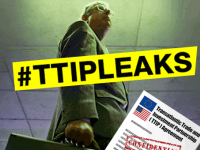Politics
Europe refuses to go to relax their health checks to favor US
Regarding the TTIP
USPA NEWS -
The European Commission and the German Government denied on Monday that is going to change the standards of consumer protection or to be privatized control of imports, as a result of negotiations that are taking place with the United States for the creation of a free trade area, called TTIP.
Greenpeace in the Netherlands made public on Monday certain secrets documents of negotiations between the US and the European Union, according to which the United States would have demanded the relaxation of European health controls on imports of products in order to favor American companies and in particular those that produce genetically modified foods. It also would have required the acceptance of private controls to replace public departments that monitor imports of products to Europe.
The European Commission and the German Government responded to the publication of documents disproving that Europe will relax its standards of consumer protection and that will change the control systems. European Trade Commissioner Cecilia Malmstron, ensured that the free trade agreement and investment with the United States (TTIP) "not lower" European regulation on the protection of consumers or the environment. For its part, the German Government denied that Europe has agreed to leave in private hands control of food imports.
Greenpeace allegations
According Greenpeace Netherlands, “none of the chapters we have seen reference the General Exceptions rule. This nearly 70-year-old rule enshrined in the GATT agreement of the World Trade Organization (WTO), allows nations to regulate trade to protect human, animal and plant life or health or for the conservation of exhaustible natural resources. The omission of this regulation suggests both sides are creating a regime that places profit ahead of human, animal and plant life and health.“
The Paris Climate Agreement “makes one point clear,“ said Greenpeace: “We must keep temperature increase under 1.5 degrees to avoid a climate crisis with effects on billions of people worldwide. Trade should not be excluded from climate action. But nothing indicating climate protection can be found in the obtained texts. Even worse, the scope for mitigation measures is limited by provisions of the chapters on Regulatory Cooperation or Market Access for Industrial Goods. As an example these proposals would rule out regulating the import of CO2 intensive fuels such as oil from Tar Sands.“
“The precautionary principle, enshrined in the EU Treaty, is not mentioned in the chapter on Regulatory Cooperation, nor in any other of the obtained 12 chapters. On the other hand the US demand for a “˜risk based´ approach that aims to manage hazardous substances rather than avoid them, finds its way into various chapters. This approach undermines the ability of regulators to take preventive measures, for example regarding controversial substances like hormone disrupting chemicals,“ said Greenpeace.
“While the proposals threaten environmental and consumer protection, big business gets what it wants. Opportunities to participate in decision making are granted to corporations to intervene at the earliest stages of the decision making process. While civil society has had little access to the negotiations, there are many instances where the papers show that industry has been granted a privileged voice in important decisions," said Greenpeace.
"The leaked documents indicate that the EU has not been open about the high degree of industry influence. The EU´s recent public report has only one minor mention of industry input, whereas the leaked documents repeatedly talk about the need for further consultations with industry and explicitly mention how industry input has been collected,“ Greenpeace Netherlands added.
Liability for this article lies with the author, who also holds the copyright. Editorial content from USPA may be quoted on other websites as long as the quote comprises no more than 5% of the entire text, is marked as such and the source is named (via hyperlink).






